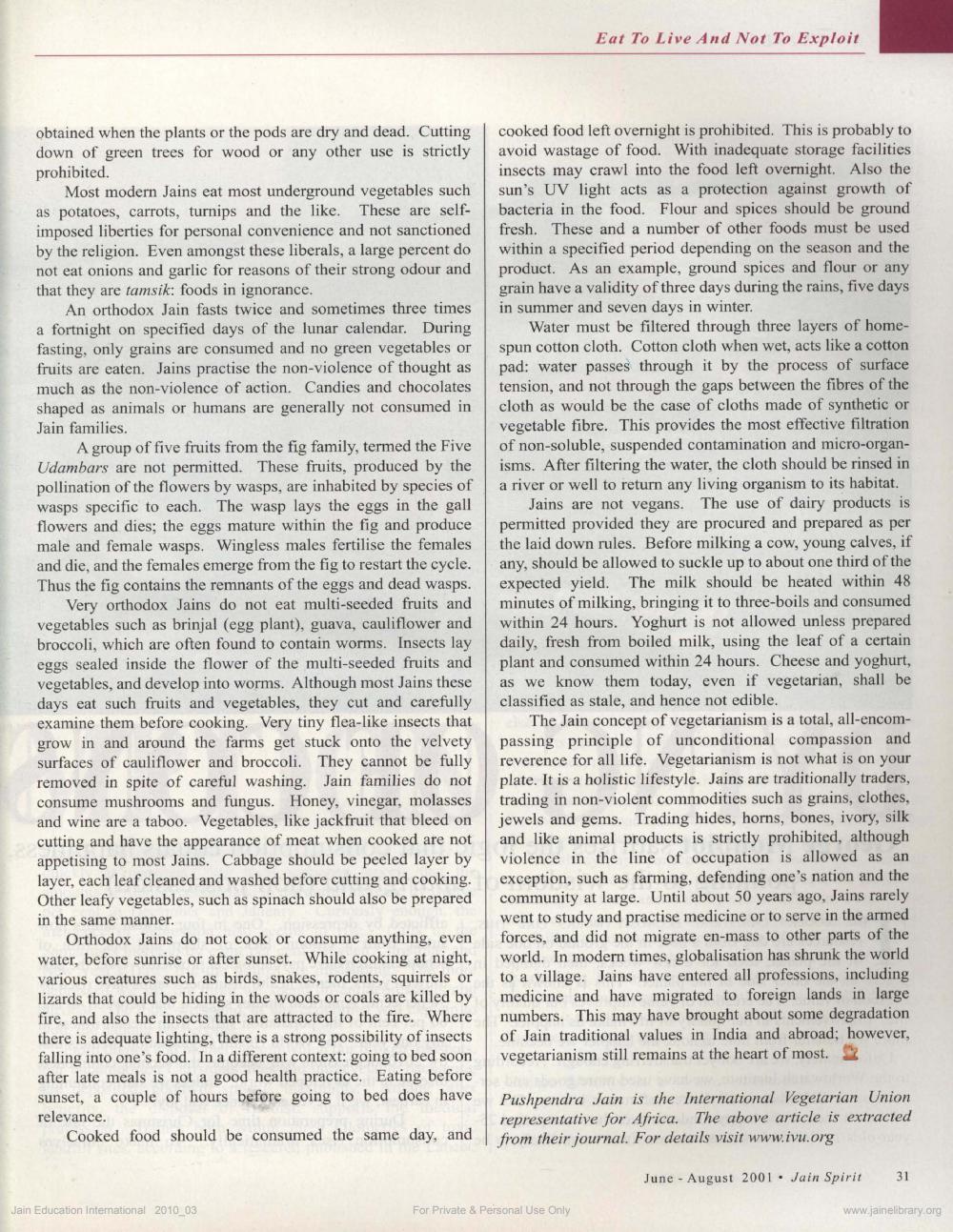________________
obtained when the plants or the pods are dry and dead. Cutting down of green trees for wood or any other use is strictly prohibited.
Most modern Jains eat most underground vegetables such as potatoes, carrots, turnips and the like. These are selfimposed liberties for personal convenience and not sanctioned by the religion. Even amongst these liberals, a large percent do not eat onions and garlic for reasons of their strong odour and that they are tamsik: foods in ignorance.
An orthodox Jain fasts twice and sometimes three times a fortnight on specified days of the lunar calendar. During fasting, only grains are consumed and no green vegetables or fruits are eaten. Jains practise the non-violence of thought as much as the non-violence of action. Candies and chocolates shaped as animals or humans are generally not consumed in Jain families.
A group of five fruits from the fig family, termed the Five Udambars are not permitted. These fruits, produced by the pollination of the flowers by wasps, are inhabited by species of wasps specific to each. The wasp lays the eggs in the gall flowers and dies; the eggs mature within the fig and produce male and female wasps. Wingless males fertilise the females and die, and the females emerge from the fig to restart the cycle. Thus the fig contains the remnants of the eggs and dead wasps.
Very orthodox Jains do not eat multi-seeded fruits and vegetables such as brinjal (egg plant), guava, cauliflower and broccoli, which are often found to contain worms. Insects lay eggs sealed inside the flower of the multi-seeded fruits and vegetables, and develop into worms. Although most Jains these days eat such fruits and vegetables, they cut and carefully examine them before cooking. Very tiny flea-like insects that grow in and around the farms get stuck onto the velvety surfaces of cauliflower and broccoli. They cannot be fully removed in spite of careful washing. Jain families do not consume mushrooms and fungus. Honey, vinegar, molasses and wine are a taboo. Vegetables, like jackfruit that bleed on cutting and have the appearance of meat when cooked are not appetising to most Jains. Cabbage should be peeled layer by layer, each leaf cleaned and washed before cutting and cooking. Other leafy vegetables, such as spinach should also be prepared in the same manner.
Orthodox Jains do not cook or consume anything, even water, before sunrise or after sunset. While cooking at night, various creatures such as birds, snakes, rodents, squirrels or lizards that could be hiding in the woods or coals are killed by fire, and also the insects that are attracted to the fire. Where there is adequate lighting, there is a strong possibility of insects falling into one's food. In a different context: going to bed soon after late meals is not a good health practice. Eating before sunset, a couple of hours before going to bed does have relevance.
Cooked food should be consumed the same day, and
Jain Education International 2010_03
Eat To Live And Not To Exploit
cooked food left overnight is prohibited. This is probably to avoid wastage of food. With inadequate storage facilities insects may crawl into the food left overnight. Also the sun's UV light acts as a protection against growth of bacteria in the food. Flour and spices should be ground fresh. These and a number of other foods must be used within a specified period depending on the season and the product. As an example, ground spices and flour or any grain have a validity of three days during the rains, five days in summer and seven days in winter.
Water must be filtered through three layers of homespun cotton cloth. Cotton cloth when wet, acts like a cotton pad: water passes through it by the process of surface tension, and not through the gaps between the fibres of the cloth as would be the case of cloths made of synthetic or vegetable fibre. This provides the most effective filtration of non-soluble, suspended contamination and micro-organisms. After filtering the water, the cloth should be rinsed in a river or well to return any living organism to its habitat.
Jains are not vegans. The use of dairy products is permitted provided they are procured and prepared as per the laid down rules. Before milking a cow, young calves, if any, should be allowed to suckle up to about one third of the expected yield. The milk should be heated within 48 minutes of milking, bringing it to three-boils and consumed within 24 hours. Yoghurt is not allowed unless prepared daily, fresh from boiled milk, using the leaf of a certain plant and consumed within 24 hours. Cheese and yoghurt, as we know them today, even if vegetarian, shall be classified as stale, and hence not edible.
The Jain concept of vegetarianism is a total, all-encompassing principle of unconditional compassion and reverence for all life. Vegetarianism is not what is on your plate. It is a holistic lifestyle. Jains are traditionally traders, trading in non-violent commodities such as grains, clothes, jewels and gems. Trading hides, horns, bones, ivory, silk and like animal products is strictly prohibited, although violence in the line of occupation is allowed as an exception, such as farming, defending one's nation and the community at large. Until about 50 years ago, Jains rarely went to study and practise medicine or to serve in the armed forces, and did not migrate en-mass to other parts of the world. In modern times, globalisation has shrunk the world to a village. Jains have entered all professions, including medicine and have migrated to foreign lands in large numbers. This may have brought about some degradation of Jain traditional values in India and abroad; however, vegetarianism still remains at the heart of most.
Pushpendra Jain is the International Vegetarian Union representative for Africa. The above article is extracted from their journal. For details visit www.ivu.org
June-August 2001 Jain Spirit 31
For Private & Personal Use Only
www.jainelibrary.org




